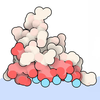+ Open data
Open data
- Basic information
Basic information
| Entry | Database: PDB / ID: 3lgw | ||||||
|---|---|---|---|---|---|---|---|
| Title | H198P/T167V double mutant of DegS-deltaPDZ protease | ||||||
 Components Components | Protease degS | ||||||
 Keywords Keywords |  HYDROLASE / HYDROLASE /  protease / stress-sensor / HtrA / PDZ OMP / protease / stress-sensor / HtrA / PDZ OMP /  Serine protease Serine protease | ||||||
| Function / homology |  Function and homology information Function and homology information peptidase Do / cellular response to misfolded protein / serine-type peptidase activity / outer membrane-bounded periplasmic space / peptidase Do / cellular response to misfolded protein / serine-type peptidase activity / outer membrane-bounded periplasmic space /  peptidase activity / serine-type endopeptidase activity / peptidase activity / serine-type endopeptidase activity /  proteolysis / identical protein binding / proteolysis / identical protein binding /  plasma membrane plasma membraneSimilarity search - Function | ||||||
| Biological species |   Escherichia coli (E. coli) Escherichia coli (E. coli) | ||||||
| Method |  X-RAY DIFFRACTION / X-RAY DIFFRACTION /  MOLECULAR REPLACEMENT / MOLECULAR REPLACEMENT /  molecular replacement / Resolution: 2.5 Å molecular replacement / Resolution: 2.5 Å | ||||||
 Authors Authors | Sohn, J. / Grant, R.A. / Sauer, R.T. | ||||||
 Citation Citation |  Journal: J.Biol.Chem. / Year: 2010 Journal: J.Biol.Chem. / Year: 2010Title: Allostery is an intrinsic property of the protease domain of DegS: implications for enzyme function and evolution. Authors: Sohn, J. / Grant, R.A. / Sauer, R.T. | ||||||
| History |
|
- Structure visualization
Structure visualization
| Structure viewer | Molecule:  Molmil Molmil Jmol/JSmol Jmol/JSmol |
|---|
- Downloads & links
Downloads & links
- Download
Download
| PDBx/mmCIF format |  3lgw.cif.gz 3lgw.cif.gz | 78.3 KB | Display |  PDBx/mmCIF format PDBx/mmCIF format |
|---|---|---|---|---|
| PDB format |  pdb3lgw.ent.gz pdb3lgw.ent.gz | 59.6 KB | Display |  PDB format PDB format |
| PDBx/mmJSON format |  3lgw.json.gz 3lgw.json.gz | Tree view |  PDBx/mmJSON format PDBx/mmJSON format | |
| Others |  Other downloads Other downloads |
-Validation report
| Arichive directory |  https://data.pdbj.org/pub/pdb/validation_reports/lg/3lgw https://data.pdbj.org/pub/pdb/validation_reports/lg/3lgw ftp://data.pdbj.org/pub/pdb/validation_reports/lg/3lgw ftp://data.pdbj.org/pub/pdb/validation_reports/lg/3lgw | HTTPS FTP |
|---|
-Related structure data
| Related structure data |  3lgiC 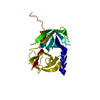 3lgtC 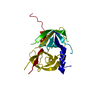 3lguC 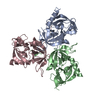 3lgvC 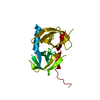 3lgyC  3lh1C  3lh3C C: citing same article ( |
|---|---|
| Similar structure data |
- Links
Links
- Assembly
Assembly
| Deposited unit | 
| ||||||||
|---|---|---|---|---|---|---|---|---|---|
| 1 | 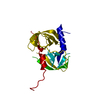
| ||||||||
| Unit cell |
|
- Components
Components
| #1: Protein | Mass: 25847.172 Da / Num. of mol.: 1 / Fragment: protease domain / Mutation: t167v, h198p Source method: isolated from a genetically manipulated source Source: (gene. exp.)   Escherichia coli (E. coli) / Strain: K12 / Gene: b3235, degS, hhoB, htrH, JW3204 / Plasmid: pET21b / Production host: Escherichia coli (E. coli) / Strain: K12 / Gene: b3235, degS, hhoB, htrH, JW3204 / Plasmid: pET21b / Production host:   Escherichia coli (E. coli) / Strain (production host): X90(DE3) Escherichia coli (E. coli) / Strain (production host): X90(DE3)References: UniProt: P0AEE3,  Hydrolases; Acting on peptide bonds (peptidases); Serine endopeptidases Hydrolases; Acting on peptide bonds (peptidases); Serine endopeptidases |
|---|---|
| #2: Water | ChemComp-HOH /  Water Water |
-Experimental details
-Experiment
| Experiment | Method:  X-RAY DIFFRACTION / Number of used crystals: 1 X-RAY DIFFRACTION / Number of used crystals: 1 |
|---|
- Sample preparation
Sample preparation
| Crystal | Density Matthews: 2.25 Å3/Da / Density % sol: 45.33 % |
|---|---|
Crystal grow | Temperature: 300 K / Method: vapor diffusion, hanging drop / pH: 6.5 Details: 50 mM Sodium Cacodylate, 50-125 mM Sodium Citrate, 10-20 % isopropanol, pH 6.5, VAPOR DIFFUSION, HANGING DROP, temperature 300K |
-Data collection
| Diffraction | Mean temperature: 100 K | ||||||||||||||||||||||||||||||||||||||||||||
|---|---|---|---|---|---|---|---|---|---|---|---|---|---|---|---|---|---|---|---|---|---|---|---|---|---|---|---|---|---|---|---|---|---|---|---|---|---|---|---|---|---|---|---|---|---|
| Diffraction source | Source:  ROTATING ANODE / Type: RIGAKU MICROMAX-007 HF / Wavelength: 1.5416 Å ROTATING ANODE / Type: RIGAKU MICROMAX-007 HF / Wavelength: 1.5416 Å | ||||||||||||||||||||||||||||||||||||||||||||
| Detector | Type: RIGAKU RAXIS IV / Detector: IMAGE PLATE / Date: Apr 10, 2009 / Details: Varimax-HF | ||||||||||||||||||||||||||||||||||||||||||||
| Radiation | Monochromator: Varimax-HF / Protocol: SINGLE WAVELENGTH / Monochromatic (M) / Laue (L): M / Scattering type: x-ray | ||||||||||||||||||||||||||||||||||||||||||||
| Radiation wavelength | Wavelength : 1.5416 Å / Relative weight: 1 : 1.5416 Å / Relative weight: 1 | ||||||||||||||||||||||||||||||||||||||||||||
| Reflection | Resolution: 2.5→50 Å / Num. obs: 7346 / % possible obs: 94.3 % / Redundancy: 4.2 % / Rmerge(I) obs: 0.034 / Net I/σ(I): 25.9 | ||||||||||||||||||||||||||||||||||||||||||||
| Reflection shell |
|
-Phasing
Phasing | Method:  molecular replacement molecular replacement |
|---|
- Processing
Processing
| Software |
| ||||||||||||||||||||||||||||
|---|---|---|---|---|---|---|---|---|---|---|---|---|---|---|---|---|---|---|---|---|---|---|---|---|---|---|---|---|---|
| Refinement | Method to determine structure : :  MOLECULAR REPLACEMENT / Resolution: 2.5→29.665 Å / Occupancy max: 1 / Occupancy min: 0.5 / SU ML: 0.15 / σ(F): 1.97 / Phase error: 38.61 / Stereochemistry target values: ML MOLECULAR REPLACEMENT / Resolution: 2.5→29.665 Å / Occupancy max: 1 / Occupancy min: 0.5 / SU ML: 0.15 / σ(F): 1.97 / Phase error: 38.61 / Stereochemistry target values: MLDetails: To obtain the best possible geometry, this structure was refined with hydrogens whose coordinates were determined by the attached heavy atom. Authors state that although hydrogens cannot be ...Details: To obtain the best possible geometry, this structure was refined with hydrogens whose coordinates were determined by the attached heavy atom. Authors state that although hydrogens cannot be visualized at this resolution, they are present and contribute to scattering. The hydrogens are kept in this entry because independent assessment of many aspects of the geometry, including steric clashes, require their presence. Moreover, removing hydrogen atoms after refinement makes independent assessment of refinement statistics effectively irreproducible.
| ||||||||||||||||||||||||||||
| Solvent computation | Shrinkage radii: 0.9 Å / VDW probe radii: 1.11 Å / Solvent model: FLAT BULK SOLVENT MODEL / Bsol: 58.572 Å2 / ksol: 0.356 e/Å3 | ||||||||||||||||||||||||||||
| Displacement parameters | Biso mean: 79.832 Å2
| ||||||||||||||||||||||||||||
| Refinement step | Cycle: LAST / Resolution: 2.5→29.665 Å
| ||||||||||||||||||||||||||||
| Refine LS restraints |
| ||||||||||||||||||||||||||||
| LS refinement shell |
|
 Movie
Movie Controller
Controller




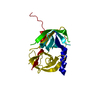
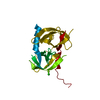
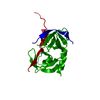
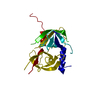
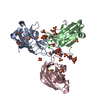
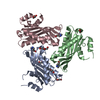
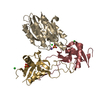
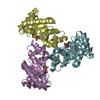
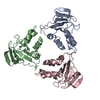

 PDBj
PDBj